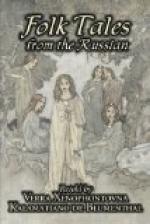The cat answered: “Well, it was because I have served thee so many years and thou hast never given me a bite, while the dear children gave me some good ham.”
The witch scolded the dogs, the gates, and the birch tree near the path.
“Well,” barked the dogs, “thou certainly art our mistress, but thou hast never done us a favor, and the orphans were kind to us.”
The gates replied:
“We were always ready to obey thee, but thou didst neglect us, and the dear children smoothed us with oil.”
[Illustration: "The children ran away as fast as their feet could possibly carry them"]
The birch tree lisped with its leaves, “Thou hast never put a simple thread over my branches and the little darlings adorned them with a pretty ribbon.”
Baba Yaga understood that there was no help and started to follow the children herself. In her great hurry she forgot to look for the towel and the comb, but jumped astride a broom and was off. The children heard her coming and threw the towel behind them. At once a river, wide and blue, appeared and watered the field. Baba Yaga hopped along the shore until she finally found a shallow place and crossed it.
Again the children heard her hurry after them and so they threw down the comb. This time a forest appeared, a dark and dusky forest in which the roots were interwoven, the branches matted together, and the tree-tops touching each other. The witch tried very hard to pass through, but in vain, and so, very, very angry, she returned home.
The orphans rushed to their father, told him all about their great distress, and thus concluded their pitiful story:
“Ah, father dear, why dost thou love us less than our brothers and sisters?”
The father was touched and became angry. He sent the wicked stepmother away and lived a new life with his good children. From that time he watched over their happiness and never neglected them any more.
How do I know this story is true? Why, one was there who told me about it.
[Illustration]
DIMIAN THE PEASANT
[Illustration] Not long ago, or perchance very long ago, I do not know for sure, there lived in a village, some place in Russia, a peasant—a moujik. And this peasant was a stubborn and a quick-tempered fellow, and his name was Dimian.
He was harsh by nature, this Dimian, and wanted everything to go his own way. If any one talked or acted against him, Dimian’s fists were soon prepared for answer.
Sometimes, for instance, he would invite one of his neighbors and treat his guest with fine things to eat and to drink. And the neighbor in order to maintain the old custom would pretend to refuse. Dimian would at once begin the dispute:
“Thou must obey thy host!”
Once it happened that a shrewd fellow called on him. Our moujik Dimian covered the table with the very best he had and rejoiced over the good time he foresaw.




